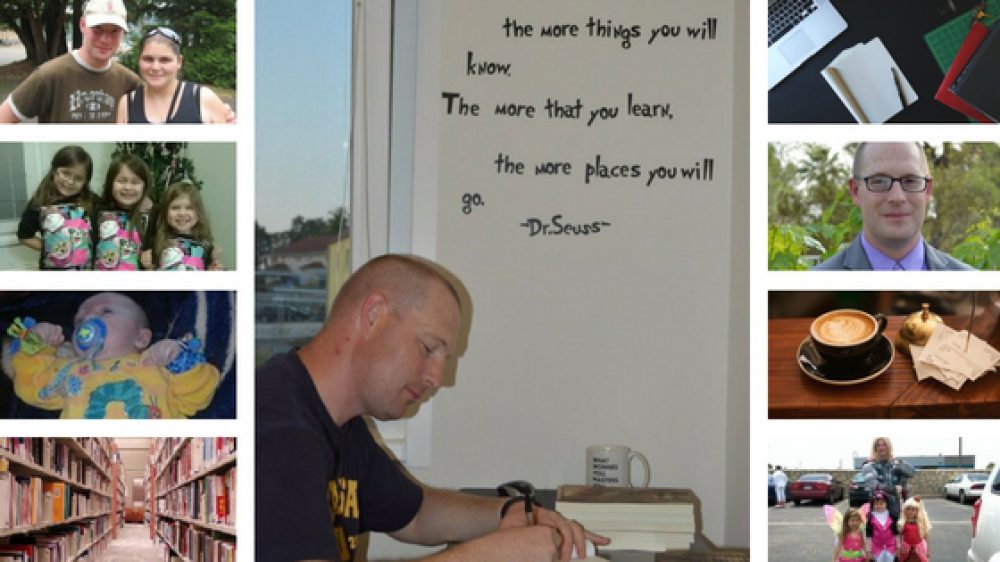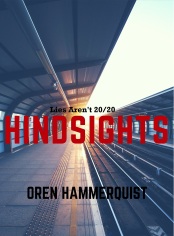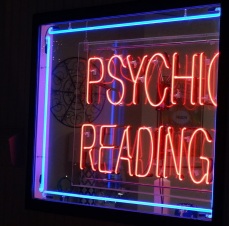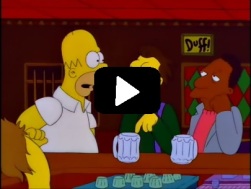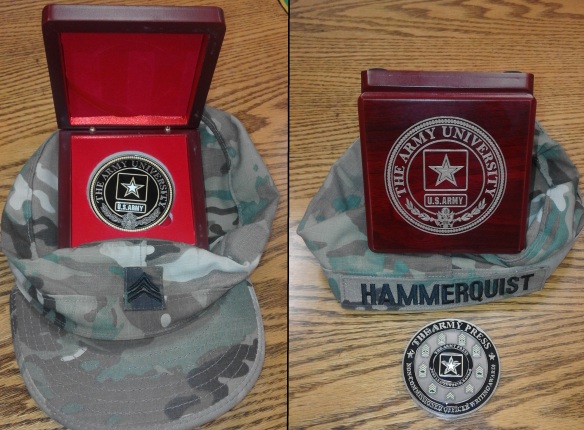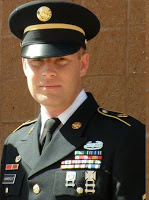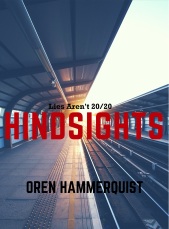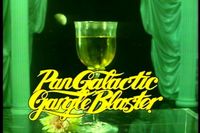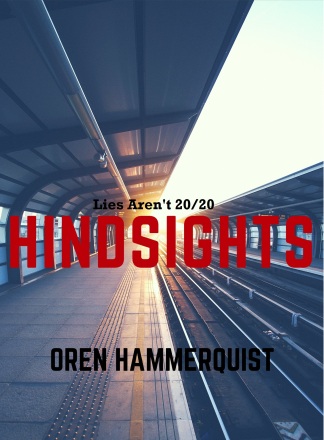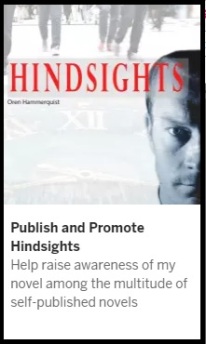 When I opened my crowdfunding campaign for Hindsights, I used the term “cross-genre novel.” The term “crowdfund” is now a mainstream word along with more ridiculous millenialisms such as “bae” or “yolo.” SMH. Crowdfund, unlike these two, is a wonderful word for those who find success. And a sick joke for those who fail.
When I opened my crowdfunding campaign for Hindsights, I used the term “cross-genre novel.” The term “crowdfund” is now a mainstream word along with more ridiculous millenialisms such as “bae” or “yolo.” SMH. Crowdfund, unlike these two, is a wonderful word for those who find success. And a sick joke for those who fail.
Since we all know what crowdfunding means (an advanced form of begging using computers and social media), let’s explore that term “cross-genre.” I define my book as a cross-genre piece, and I imagine most serious authors would like to place their work into that category. And who can blame them? Placing a novel into a single genre pigeonholes that novel; simplifies that novel; seems to minimalize its contribution to literature. 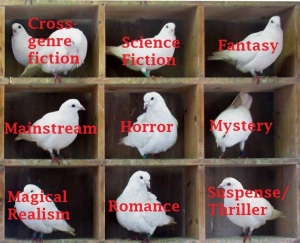
Simply put, cross-genre means it doesn’t fit into a single genre of literature. Some cross-genre mixtures become standard fare. Science fiction/fantasy has become so familiar that people often don’t think twice. The Star Wars enterprise shows one way we mix fantasy (sword fights and magic) with sci-fi (lasers). On the television/movie theme, we might look at Firefly/Serenity or the surprisingly good Cowboys vs. Aliens as a cross-genre western/science fiction. But for those of us who prefer to let our imagination supply the visual effects, here is a list of cross-genre novels everyone should read.
1. Slaughterhouse Five
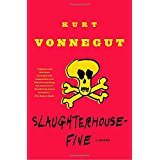 This novel about the bombing of Dresden days before the end of the World War II and about the veterans who lived through the war and this raid tops my list. (Historical note: The bombing of Dresden was far more devastating by death toll than Nagasaki or Hiroshima.) Not only is this one of the best cross-genre novels ever written, but I also list it as one of my favorite novels ever written. From the moment Vonnegut tells us “Billy Pilgrim has come unstuck in time,” we know that this is an uncommon approach. Poor Billy Pilgrim is flung between the war in Dresden and Europe, his life as an optometrist, and the planet Trafaldemore. Or maybe he isn’t. Between the head injury and the shell shock, we can’t be sure. This story about PTSD or alcoholism or time/space travel is my benchmark I hope one day to reach.
This novel about the bombing of Dresden days before the end of the World War II and about the veterans who lived through the war and this raid tops my list. (Historical note: The bombing of Dresden was far more devastating by death toll than Nagasaki or Hiroshima.) Not only is this one of the best cross-genre novels ever written, but I also list it as one of my favorite novels ever written. From the moment Vonnegut tells us “Billy Pilgrim has come unstuck in time,” we know that this is an uncommon approach. Poor Billy Pilgrim is flung between the war in Dresden and Europe, his life as an optometrist, and the planet Trafaldemore. Or maybe he isn’t. Between the head injury and the shell shock, we can’t be sure. This story about PTSD or alcoholism or time/space travel is my benchmark I hope one day to reach.
2. The Time Traveler’s Wife
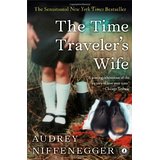 Often, when someone asks what “cross-genre” means, people will simply cite this book. Probably because it is also a movie. Personally, I would not consider this cross-genre, but “magical realism.” That style allows for realistic worlds with a few magical or at least extra-real elements that drive the story. In this book, the male lead is pulled backward and forward through time. Constant to most of his trips is his future/past/current wife. They fall in love after he meets her and when she has known him for years. As their love buds he forgets it and then disappears while she waits for him to meet him the normal way, bu…. Actually, it’s probably best if you just read it. It’s like Doctor Who with less running.
Often, when someone asks what “cross-genre” means, people will simply cite this book. Probably because it is also a movie. Personally, I would not consider this cross-genre, but “magical realism.” That style allows for realistic worlds with a few magical or at least extra-real elements that drive the story. In this book, the male lead is pulled backward and forward through time. Constant to most of his trips is his future/past/current wife. They fall in love after he meets her and when she has known him for years. As their love buds he forgets it and then disappears while she waits for him to meet him the normal way, bu…. Actually, it’s probably best if you just read it. It’s like Doctor Who with less running.
3. Abraham Lincoln Vampire Hunter
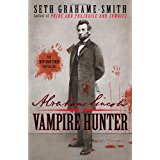 I am… well maybe ashamed isn’t the right word, but I haven’t read this book yet. It’s on my shortlist. I watched the movie when I was on a business trip because I thought it would be good for a laugh with a few beers (like Sharknado or Snakes on a Plane). I was surprised to find a complex and rather engaging story. With Lincoln killing vampires with his silver-coated ax. As ridiculous as it sounds, the premise is engaging and approaching historical at times. Unlike the above book, there is no doubt this is a cross-genre piece.
I am… well maybe ashamed isn’t the right word, but I haven’t read this book yet. It’s on my shortlist. I watched the movie when I was on a business trip because I thought it would be good for a laugh with a few beers (like Sharknado or Snakes on a Plane). I was surprised to find a complex and rather engaging story. With Lincoln killing vampires with his silver-coated ax. As ridiculous as it sounds, the premise is engaging and approaching historical at times. Unlike the above book, there is no doubt this is a cross-genre piece.
4. Cloud Atlas
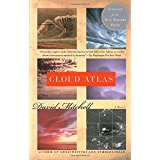 No discussion of cross-genre fiction would be complete without this book. Which is odd as it is absolutely not a cross-genre piece. Genres like the terms “good” or “bad” books are relative and subjective. Mitchell’s piece is interesting (even if the movie wasn’t) due to the strange story arc that brings us through stories in a plotline tied my reminiscences of characters. I think people consider this cross-genre simply because parts of it happen without a lot of obvious science fiction. At the end/beginning/middle, the storyteller lives in a world seemingly devoid of technology. We would call this dystopian science fiction. One portion happens in current-day, but because it ties in as a back story to all else, we cannot really separate it from the science fiction. Still, this book is worth a read and probably a second read so you understand what just happened.
No discussion of cross-genre fiction would be complete without this book. Which is odd as it is absolutely not a cross-genre piece. Genres like the terms “good” or “bad” books are relative and subjective. Mitchell’s piece is interesting (even if the movie wasn’t) due to the strange story arc that brings us through stories in a plotline tied my reminiscences of characters. I think people consider this cross-genre simply because parts of it happen without a lot of obvious science fiction. At the end/beginning/middle, the storyteller lives in a world seemingly devoid of technology. We would call this dystopian science fiction. One portion happens in current-day, but because it ties in as a back story to all else, we cannot really separate it from the science fiction. Still, this book is worth a read and probably a second read so you understand what just happened.
5. Atlas Shrugged
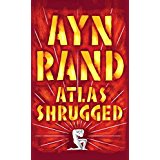 Now I’ve made my Republican friends happy. This book is well known for its statements on “objectivism” and the opinion that any interference by the government at any time is horrible. Also, John Galt gives a speech (or should I call it a sermon) that spans about three chapters and two hours of my life. My main complaint with this title, and all her books, is simply the way it is almost sanctified by true believers in GOP. Regardless, it is a well-written book (except for the 250 pages of John Galt preaching) that mixes science fiction with political satire (without the humor).
Now I’ve made my Republican friends happy. This book is well known for its statements on “objectivism” and the opinion that any interference by the government at any time is horrible. Also, John Galt gives a speech (or should I call it a sermon) that spans about three chapters and two hours of my life. My main complaint with this title, and all her books, is simply the way it is almost sanctified by true believers in GOP. Regardless, it is a well-written book (except for the 250 pages of John Galt preaching) that mixes science fiction with political satire (without the humor).
6. Catch 22
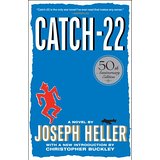 Isn’t this just pure satire? Pigeonholes and genres are somewhat subjective. Some might say that pigeonhole is actually a shelf while others might say that novel is a drama. I would say we could consider it cross-genre because it has wide appeal. The war aspects of this novel are somewhat hidden, like the bomber dying in the plane, behind many layers of satire. Furthermore, the non-linear storytelling is not typical of satire or war pieces. Personally, I’d put this on your short list regardless of how many pigeonholes it fits into.
Isn’t this just pure satire? Pigeonholes and genres are somewhat subjective. Some might say that pigeonhole is actually a shelf while others might say that novel is a drama. I would say we could consider it cross-genre because it has wide appeal. The war aspects of this novel are somewhat hidden, like the bomber dying in the plane, behind many layers of satire. Furthermore, the non-linear storytelling is not typical of satire or war pieces. Personally, I’d put this on your short list regardless of how many pigeonholes it fits into.
7. The Handmaid’s Tale
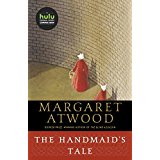 Though I admit I first discovered this through Hulu, I quickly bought and read the book. Why do we consider this cross-genre? One could easily argue this is a dystopian novel such as 1984 or A Canticle for Liebowitz. The literary style is what sets it apart from its peers. Leaving the word “literary style” for another time, Atwood writes as if Virginia Woolf and George Orwell got together and tried to write a Nathaniel Hawthorne homage novel. If you know what that means, good for you. If you don’t, it means read Margaret Atwood.
Though I admit I first discovered this through Hulu, I quickly bought and read the book. Why do we consider this cross-genre? One could easily argue this is a dystopian novel such as 1984 or A Canticle for Liebowitz. The literary style is what sets it apart from its peers. Leaving the word “literary style” for another time, Atwood writes as if Virginia Woolf and George Orwell got together and tried to write a Nathaniel Hawthorne homage novel. If you know what that means, good for you. If you don’t, it means read Margaret Atwood.
8. The Stand
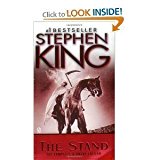 Did you think Stephen King only wrote horror? Actually, King frequently jumps genres. Some are horror, some thriller, one landmark book on writing, one (or seven) fantasy novels… The Stand isn’t quite any of these. The virus that kills most of the world seems to be science fiction. However, the reactions by the world are surprisingly, and hauntingly, realistic. Then, from realism he jumps to horror. Lastly, in the final act, he introduces a purely and almost inexplicably supernatural element in Randall Flagg. The broad appeal of this particular book definitely places it in my cross-genre list.
Did you think Stephen King only wrote horror? Actually, King frequently jumps genres. Some are horror, some thriller, one landmark book on writing, one (or seven) fantasy novels… The Stand isn’t quite any of these. The virus that kills most of the world seems to be science fiction. However, the reactions by the world are surprisingly, and hauntingly, realistic. Then, from realism he jumps to horror. Lastly, in the final act, he introduces a purely and almost inexplicably supernatural element in Randall Flagg. The broad appeal of this particular book definitely places it in my cross-genre list.
9. Interview with the Vampire
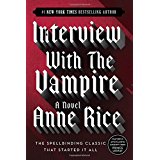 This book sometimes finds its way onto cross-genre lists. If you have only seen the movie, you missed out. (The movie is terrible; the book fantastic.) It is, first and foremost, a book about vampires. However, it isn’t by any means a horror novel. Rice manages to mix in romance without sex. There is an unspoken tension here with very adult themes. Louis battles with very complex emotions between Lestat and Claudia. There are hints of taboo subjects (not surprising for anyone familiar with Rice’s early work) such as homoeroticism and possibly pedophilia. But these never develop fully because immortality robs these lost souls of their humanity. It is the artistry of this book that makes it too good to become lost in a pigeonholed genre.
This book sometimes finds its way onto cross-genre lists. If you have only seen the movie, you missed out. (The movie is terrible; the book fantastic.) It is, first and foremost, a book about vampires. However, it isn’t by any means a horror novel. Rice manages to mix in romance without sex. There is an unspoken tension here with very adult themes. Louis battles with very complex emotions between Lestat and Claudia. There are hints of taboo subjects (not surprising for anyone familiar with Rice’s early work) such as homoeroticism and possibly pedophilia. But these never develop fully because immortality robs these lost souls of their humanity. It is the artistry of this book that makes it too good to become lost in a pigeonholed genre.
10. The Alchemist
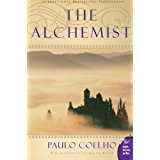 I once saw a review of this book saying, “He just took old stories from others rather than write his own story.” Even if I could find this review again, I wouldn’t embarrass the reviewer by showing the world how ignorant he or she can be. Yes, this novel is partially historical fiction. The constant mix of magic (alchemy) also brings an element of the surreal throughout. Despite this, we might be tempted to try to list it as fantasy except for the artistry of Coelho’s writing. Many people simply hate this book; many people simply love this book. Few are indifferent. Perhaps this is the mark of a truly wonderful book.
I once saw a review of this book saying, “He just took old stories from others rather than write his own story.” Even if I could find this review again, I wouldn’t embarrass the reviewer by showing the world how ignorant he or she can be. Yes, this novel is partially historical fiction. The constant mix of magic (alchemy) also brings an element of the surreal throughout. Despite this, we might be tempted to try to list it as fantasy except for the artistry of Coelho’s writing. Many people simply hate this book; many people simply love this book. Few are indifferent. Perhaps this is the mark of a truly wonderful book.
11. Hindsights
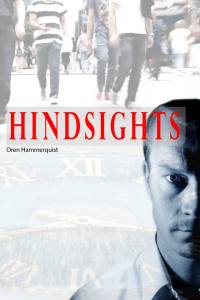 See what I did there? This book is less genre-crossing than some and might fall into the category of magical realism. Political satire (the Ayn Rand kind, not the Joseph Heller kind) laces through this novel. Mysteries also abound as Nathan Wald tries to unravel a web of hidden agendas. And don’t forget the love story.
See what I did there? This book is less genre-crossing than some and might fall into the category of magical realism. Political satire (the Ayn Rand kind, not the Joseph Heller kind) laces through this novel. Mysteries also abound as Nathan Wald tries to unravel a web of hidden agendas. And don’t forget the love story.
Make this book a reality Click Here to support my novel and claim your FREE COPY.
